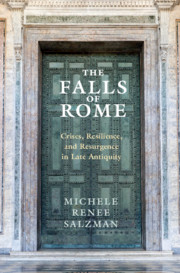'Michele Salzman’s The Falls of Rome does nothing less than re-write the history of the city of Rome in the last centuries of the ancient world. Based on scrupulous attention to evidence of every kind, her account offers a new perspective on almost every aspect of the fate of this vast city and of the remarkable families who rallied again and again to rescue and renew it after every crisis. Here is no story of ineluctable Decline and Fall in the manner of Edward Gibbon, still less of the triumphant absorption of a pagan city by the popes of Rome. Instead, the Roman Senate and its members hold center stage. Seldom has an ancient aristocracy shown such tenacity and such resilience in difficult times. Nor has any recent scholar shown such a gift for conjuring up, from such scattered and easily-neglected evidence, the profile of the distinguished men and women, the emperors and the generals, the grandees and the priests whose dogged defense of the traditions of their unique city imposed their own pace of change on a crisis-ridden age. This is scholarship at its best. The book is a model and a masterpiece.'
Peter Brown - Princeton University
'Among the many recent studies of the fall of the Roman Empire, the city of Rome is often understood as the handmaiden to the process of decline and ruin. Michele Salzman’s book is the first of its kind to place the ancient capital in proper perspective and, in doing so, breathes new life into exhausted narratives. Meticulously researched and elegantly argued, this book traces the role of the elites at Rome through the dramatic changes of the Empire’s last centuries and finds that, in spite of the intimate symbiosis of city to Empire, the leading citizens of Rome were the authors of continued vitality and resilience in the face of repeated disasters. As a scholar of urban and social history, Salzman is exemplary, and The Falls of Rome is destined to become the foundation of future studies of the city for decades to come.'
Shane Bjornlie - Claremont McKenna College
'In The Falls of Rome, Michele Salzman offers a gripping account of the disasters that struck the Eternal City between the third and seventh centuries and the efforts Roman senators and bishops made to bring the city back from catastrophe. The city of Rome and the elites who shaped it all come alive as Salzman recounts the multiple crises and recoveries that together demonstrate how Rome’s resilience grew out of the dedication of its civic leaders.'
Edward Watts - University of California, San Diego
'Who? What? When? Where? Why? Michele Salzman draws on her broad and deep erudition to revisit the whodunnit that is the Roman empire from Constantine to Justinian and a little after. She tracks the sometimes suspicious, often obtuse behavior of the grandly self-absorbed aristocrats of the age to tell a story far richer than mere epic narrative.'
James O’Donnell - University of Arizona
‘We are fortunate to have in The Falls of Rome a study that raises so many questions as it answers far more.’
David Ungvary
Source: Bryn Mawr Classical Review
'[Appeals] especially to those readers interested in the political and administrative history of the late Western Roman Empire … A lengthy series of tables (60 pages) providing the names, dates, religion, and family origins/social connections of officeholders of important civic positions, such as the urban prefecture, is invaluable for historians of the period … Recommended'.
R. T. Ingoglia
Source: Choice
‘This book makes it clear that the elite that continued to support the Old Capital did believe in the legacy of Rome and in the preservation of the values of Romanitas. Any scholar of late antique Rome will benefit from this book.’
Massimiliano Vitiello
Source: Speculum: A Journal of Medieval Studies



